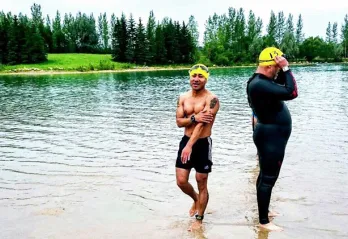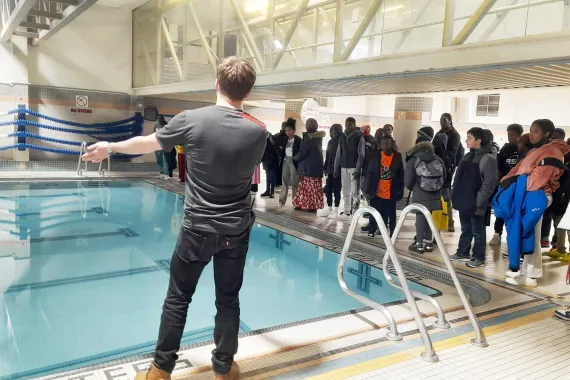Making Waves of Change

Fidel Pacay, originally from Guatemala, faced a pivotal moment in his 30s that would change his life forever. For his birthday, a group of friends organized a surprise outing to the stunning Sooke Potholes in Victoria, BC.
"I didn't know where we were going; it was a surprise," Pacay recalls. "Once I got there, I realized, 'Oh, this is like a beautiful place with waterfalls.' Thankfully, I brought a book because I was just going to read while they swam."
As his friends enjoyed the water, Pacay sat on the sidelines. "They felt bad because they didn't realize I didn't know how to swim," he says. "That day, I realized how much fun I was missing out on."
Determined to change this, Pacay used his membership at the YMCA-YWCA in BC to start taking adult swimming lessons on Tuesdays and Thursdays. "I made it my goal, and I did not let go of swimming lessons for a full year," he recalls.
His dedication paid off as he began to embrace the water. With his newfound swimming skills, Pacay set his sights higher. "Once I learned to swim, I realized I already loved biking and running. I thought, 'Does that mean I can do a triathlon?'"
Pacay recalls his first triathlon experience, which included a 350-meter swim, a 10-kilometer bike ride, and a 3-kilometer run. Reflecting on the event, Pacay humorously recalls his initial worries: "I thought I'd be the last one coming out of the water."
His nervousness escalated when, upon transitioning to the biking segment, he realized he had forgotten his jersey. "I was already at the back, and competitors were passing. I had no idea what to do," Pacay recounts.
However, a generous spectator noticed his predicament. "He took his shirt off and was like, 'Dude, just wear my shirt!' This allowed me to continue the race on the bike, and I started passing others," Gaining momentum, Pacay passed the other participants one by one and eventually placed fourth in the competition.
"These experiences motivate me to show other newcomers that swimming can be fun and safe if we know how to respect the water," Pacay emphasizes, highlighting the transformative impact of his triathlon journey on his advocacy for water safety and community engagement.
Pacay has since moved to Manitoba and had jobs related to biking and education. As an immigrant, Pacay notes the lack of positive swimming stories within his community. "We don't hear about immigrants learning to swim and completing triathlons. We only hear about drownings," he explains.
This realization hit home when he heard about the tragic drowning of a 12-year-old boy in Manitoba in 2022. "It was heartbreaking," Pacay reflects. "As an immigrant myself, I understand the fear and hesitation that can come with water activities. But tragedies like this remind us of the importance of water safety education."
Motivated by this incident, Pacay decided to give back to the community. He had previously run a successful afterschool Bike Club at Gordon Bell High School through his nonprofit organization, The MAYA Project (Manitoba Alliance for Young Adults). He built on this experience to create and coordinate the "Swim to Survive" program, ensuring newcomers learn essential swimming skills and water safety.

Reflecting on his journey, Pacay recalled his experiences with friends and boating: "I remember my first time jumping into the water from a boat in the middle of the lake. I was like, 'I'm gonna dive in,' but instead of diving properly, I just kind of splashed in. It was pretty funny. And that's the beauty of learning to swim—each achievement builds confidence and breaks down barriers. That's why I'm passionate about encouraging newcomers and youth in general to embrace swimming."
The "Swim to Survive" program emerged from Pacay's deep personal commitment to water safety and community empowerment. Partnering with the YMCA-YWCA of Winnipeg and Peaceful Village, an organization supporting after-school activities, Pacay aimed to address a critical gap in swimming education among newcomers and youth.
"As a community hub, the Y is nothing without its community partners," says Findlay McLandress, Manager of Downtown Aquatics. "The Y is a large enough organization that it can appear nebulous at times, so having partners like Fidel, the MAYA Project, and Peaceful Village be able to reach out to members of the community through the social networks they've worked to build and add that personal element is such a joy."
The collaboration began with a simple idea: leverage existing resources and facilities to make swimming accessible. Pacay reached out to the Peaceful Village at Gordon Bell High School to introduce the program to potential participants. Through coordinated efforts, they managed to recruit 35 eager participants, comprising 25 girls and 10 boys, for the inaugural session.
"The response was overwhelming," Pacay recalls. Participants gained essential life-saving skills and confidence in the water, thanks to structured lessons provided by YMCA instructors. "For many of these youths, it was their first time learning to swim in a formal setting. It wasn't just about swimming; it was about building resilience and fostering a sense of belonging in the community."
McLandress adds, "Swimming is such an essential skill; knowing how to swim can literally save a life, and it's a skill that can be learned at any age. I'm sure Fidel shared this with you already, and I recommend asking him about it if he didn't, but he first learned to swim at a Y in BC as an adult. I think having that personal experience and the firsthand knowledge that anyone can learn to swim is part of what made it such a privilege to work with Fidel."
Reflecting on his own journey as an immigrant from Guatemala, Pacay understands that many people do not have access to swimming lessons or even water to learn to swim in. "Back home, swimming wasn't readily accessible, and many of us grew up without formal lessons," he notes. "But here in Canada, surrounded by lakes and rivers, knowing how to swim is not just a recreational skill; it's a safety imperative."
"It was Fidel's hard work and his connections at Gordon Bell and Peaceful Village that made the program possible," McLandress says. "We are incredibly fortunate to be in a position where we can collaborate with dedicated individuals like Fidel who have noticed a need within their community and strive to make a change."
The program's success prompted Pacay to plan for future expansions. "I'm hoping to run the program again next winter and increase our reach," he shares optimistically. "We started with 35 participants, and I aim to double that number next time, possibly including children as young as six years old because I believe it is more effective to introduce them to water at a younger age."
Central to Pacay's vision is breaking down barriers that prevent youth from accessing recreational facilities like the YMCA. "It's not just about offering programs; it's about making them accessible," he emphasizes. "Many young people face hurdles like transportation or financial constraints. By collaborating with organizations like Peaceful Village and the YMCA, we're working to make these opportunities more inclusive and welcoming."
Looking ahead, Pacay plans to streamline program logistics and secure additional support to sustain and expand Swim to Survive. "There's a real need for these programs," he reflects. "Not just among newcomers, but also within indigenous and low-income communities. Everyone deserves the chance to learn essential life skills and feel safe around water."
As Pacay continues his work as an educational assistant and advocate for community-driven initiatives, his dedication to empowering youth through sports and education remains unwavering. "It's about more than just teaching swimming," he concludes. "It's about giving young people the tools to thrive and stay safe in their new environment."